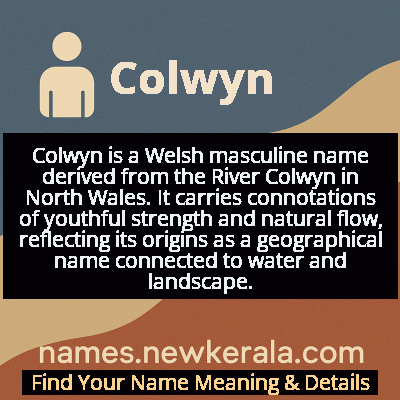Colwyn Name Meaning & Details
Origin, Popularity, Numerology Analysis & Name Meaning of Colwyn
Discover the origin, meaning, and cultural significance of the name COLWYN. Delve into its historical roots and explore the lasting impact it has had on communities and traditions.
Name
Colwyn
Gender
Male
Origin
Welsh
Lucky Number
2
Meaning of the Name - Colwyn
Colwyn is a Welsh masculine name derived from the River Colwyn in North Wales. It carries connotations of youthful strength and natural flow, reflecting its origins as a geographical name connected to water and landscape.
Colwyn - Complete Numerology Analysis
Your Numerology Number
Based on Pythagorean Numerology System
Ruling Planet
Moon
Positive Nature
Diplomatic, friendly, artistic, empathetic.
Negative Traits
Over-sensitive, moody, indecisive, prone to self-pity.
Lucky Colours
Green, cream, white.
Lucky Days
Monday.
Lucky Stones
Pearl, moonstone.
Harmony Numbers
1, 3, 4.
Best Suited Professions
Diplomats, mediators, caregivers, artists.
What People Like About You
Cooperative spirit, friendliness, artistic talent.
Famous People Named Colwyn
Colwyn Bay
Geographical Location
Famous seaside town in North Wales named after the river, known for its Victorian architecture and tourism
Colwyn Foulkes
Architect
Welsh architect known for his restoration work on historic Welsh buildings and churches
Colwyn Rowe
Rugby Player
Welsh rugby union player who represented Wales in international competitions
Colwyn Trevarthen
Psychologist
Emeritus professor known for research in child psychology and infant communication
Name Variations & International Equivalents
Click on blue names to explore their detailed meanings. Gray names with will be available soon.
Cultural & Historical Significance
As a personal name, Colwyn represents the Welsh tradition of naming children after local geographical features, connecting individuals to their ancestral lands. The name gained prominence through places like Colwyn Bay, a Victorian seaside resort that became a symbol of Welsh coastal culture and tourism. Throughout Welsh history, names derived from natural features like rivers and valleys have been particularly valued for their connection to the land and Celtic heritage, with Colwyn embodying this tradition while maintaining a distinctly masculine character.
The name also reflects the Welsh practice of preserving linguistic and cultural identity through naming conventions, serving as a living link to Wales' Celtic past while adapting to modern usage. This dual nature—both ancient and contemporary—makes Colwyn a meaningful choice for families seeking to honor their Welsh roots while embracing current naming practices.
Extended Personality Analysis
Individuals named Colwyn are often perceived as possessing a strong connection to nature and tradition, reflecting their Welsh river namesake. They typically exhibit qualities of resilience and adaptability, much like a river that flows steadily through changing landscapes. Colwyns are often described as thoughtful and introspective, with a deep appreciation for history and cultural heritage that stems from their name's ancient roots. Their calm demeanor often masks a strong inner current of determination and purpose.
In social settings, Colwyns tend to be reliable and steadfast friends, known for their loyalty and quiet strength. They often demonstrate excellent problem-solving skills and patience, approaching challenges with the persistent determination of water carving through stone over time. While they may appear reserved initially, Colwyns possess strong leadership qualities that emerge when needed, combining traditional values with modern practicality in a way that makes them effective in both personal and professional relationships. Their natural empathy and listening skills make them valued confidants, while their creative problem-solving abilities often lead to innovative solutions that respect tradition while embracing progress.
Modern Usage & Popularity
In contemporary times, Colwyn remains a relatively uncommon but cherished name, primarily used within Welsh communities and by families with Celtic heritage. The name has maintained steady but low usage in Wales and among the Welsh diaspora, particularly in countries like England, Canada, Australia, and the United States. While it has never reached mainstream popularity charts, Colwyn enjoys a niche appeal among parents seeking traditional Welsh names that are distinctive yet accessible. Modern usage often reflects a desire to honor Welsh ancestry or appreciation for Celtic culture, with the name frequently chosen by families who value its connection to natural landscapes and Welsh history. Recent years have seen a slight increase in usage as traditional Celtic names experience renewed interest, though it remains outside the top 1000 names in most English-speaking countries, preserving its unique character.
Symbolic & Spiritual Meanings
Symbolically, Colwyn represents the enduring flow of heritage and the life-giving properties of water in Celtic tradition. Like a river, the name embodies concepts of continuity, adaptability, and natural strength—flowing steadily through generations while shaping the landscape of identity. The river symbolism connects to themes of purification, wisdom, and the passage of time, suggesting someone who moves through life with purpose and resilience while maintaining connection to their origins.
Metaphorically, Colwyn signifies the bridge between ancient traditions and modern existence, much like a river that has witnessed centuries of history while remaining vital to contemporary life. The name carries connotations of depth beneath calm surfaces, hidden strength, and the ability to nourish growth in others. In Welsh symbolic tradition, river names often represent both physical and spiritual journeys, making Colwyn emblematic of personal development, cultural continuity, and the timeless connection between people and their ancestral lands. The name suggests a person who carries forward tradition while adapting to changing circumstances, embodying the wisdom that comes from understanding both past and present.

